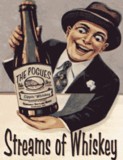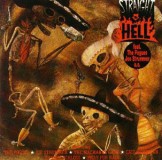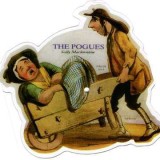THE POGUES & SHANE MACGOWAN
Borrowed Music

This is an attempt to trace and put together musical inspirations for Pogues / Shane’s songs. The Borrowed music thread at the Pogues forum served as a valuable source of info. I guess the list is by no means complete and if you know about anything else to add, I’ll be happy to include it. Just email me: zuzana(at)pogues.com
RED ROSES FOR ME
Transmetropolitan
The melody at the very beginning and the end is borrowed from Dublin in the Rare Old Times, a song composed by Pete St. John (of the Fields of Athenry fame), depicting the changes that have taken place in Dublin over the years. The lyrics can be found at Wikipedia, the song has been covered by many bands including the Dubliners and Flogging Molly.
Sea Shanty
Instrumental parts of the melody are a popular Irish jig called Kesh Jig. (The same melody is used also in Paddy Public Enemy No. 1.) Flogging Molly borrowed Kesh Jig as well – for their song Salty Dog ("Swagger" album).
-------------------------------------------------------------------------------------------------------------------------------------------------------------------------------
RUM, SODOMY & THE LASH
Billy’s Bones
The melody is inspired by Mrs McGrath, folk song about a mother whose son returns home from war, having lost both his legs. Some more info (taken from here, where there are also full lyrics and midi): The composer of the words and lyrics to this song is unknown. It was definitely known before World War I and was popular with Irish Republicans before that war. It was also popular in the Easter Uprising of 1916. However, according to John Anthony Scott's "The Ballad of America", Mrs. McGrath appeared on a broadside published in Dublin as early as 1815. McGrath is pronounced "McGraw." The foreign war referred to in the song is the Penninsular Campaign of 1808-1814 in the Napoleonic Wars. Burl Ives writes: "The thought underlying this song is an expression of courage, the use of wit to paint a tragedy and make the telling bearable." The Dubliners recorded a parody of the original song, turning it into a story about a mother whose son is fired from college for drinking and messing with women. Their lyrics can be found here.
Old Main Drag
Shares the melody with Contessa, a song recorded by an Italian band Modena City Ramblers for their album "Riportando Tutto a Casa" (1994). However, as MCR started playing in 1991, it seems that in this case it was them borrowing the tune from the Pogues. Homepage of MCR can be found here.
-------------------------------------------------------------------------------------------------------------------------------------------------------------------------------
IF I SHOULD FALL FROM GRACE WITH GOD
Fairytale Of New York
Parts of the melody are borrowed from another Pogues song The Broad Majestic Shannon.
Fiesta
Borrows the melody from Lichtensteiner Polka by Edmund Koetscher and Rudi Lindt (1957). Sample can be found here. More info about the origins of Fiesta and the reasons for using the Lichtensteiner Polka melody in Songs & Stories section.
The Broad Majestic Shannon
The instrumental bridge is a harp tune Tabhair Dom Do Lamh (Give me your hand) by Ruairi Dall O'Cathain (1570-1650). The tune was recorded, among others, by The Chieftains, Planxty and Alan Stivell (under the title Rory Dall's Love Tune). Some more info (from the book Carolan: "The Life Times and Music of an Irish Harper" by Donal O'Sullivan, originally posted here): "He [Rory Dall] took a fancy to visit Scotland, where there were great harpers. He took his retinue (or suite) with him. Amongst other visits in the style of an Irish chieftain he paid one to a Lady Eglinton, and she (not knowing his rank) in a peremptory manner demanded a tune, which he declined as he only came to play to amuse her, and in an irritable manner left the house. However, when she was informed of his consequence she eagerly contrived a reconciliation and made an apology, and the result was that he composed a tune for her ladyship, the handsome tune of Da mihi manum ('Give me your hand'), for which his fame reached through Scotland and came to the ears of the Gunpowder Plot prophet James the First of England (then the Sixth of Scotland)..." Samples of the tune are here and here.
South Australia
The instrumental at the end is a tune going by various names – sometimes it’s called Salmon Tails Down the Water, but as Philip Chevron commented at Pogues.com forum: "A post on that link also calls it The Kerry Polka, which rings a bell - I'm pretty sure that's how Mr Woods always referred to it." Mp3 of the tune can be found here (in a medley).
-------------------------------------------------------------------------------------------------------------------------------------------------------------------------------
PEACE & LOVE
White City
Is a quickened version of the Curragh Of Kildare, traditional song with lyrics based on the poem Winter It Is Past by Robert Burns (the whole poem can be found here). The folk song was recorded, among others, by Christy Moore and The Fureys. The Curragh is situated in the heart of Kildare and is a plain of five thousand acres, with a racecourse at its border on the Newbridge side. Lyrics and a sample of the song can be found here.
London You're a Lady
Borrows the melody from a harp tune called Fanny Power (or Planxty Fanny Poer) by the famous Irish blind harper O'Carolan (1670 – 1738). More info (taken from here, where a midi can also be found): "This tune is also called Mrs. Trench. Fanny (Frances) Power was an heiress, daughter of David and Elizabeth Power of Coorheen, Loughrea (for whom Carolan wrote Carolan's Concerto or Mrs. Power). In 1732 Fanny married Richard Trench of Gerbally, County Galway. The tune was probably composed before her wedding because in the second verse (the Gaelic lyrics) Carolan expresses hope he will live to dance at her wedding.".
-------------------------------------------------------------------------------------------------------------------------------------------------------------------------------
HELL'S DITCH
Rainbow Man
James Fearnley came up with this observation at the Pogues.com forum: "I was listening to 93.1 in Los Angeles the other day (don't usually listen to that particular radio station, but I was bored with the wallpaper on KCRW and was flipping stations) when I heard ZZ Top's Sharp Dressed Man and wondered why it sounded so familiar, until I realized how like Rainbow Man it was."
House of the Gods
The intro melody (and instrumental bridge in the song) is borrowed from the Beach Boys' song You Still Believe in Me (second track on their "Pet Sounds" album, written by Brian Wilson, with lyrics by Tony Asher). In a 1990 interview with David Leaf, Paul McCartney said about You Still Believe in Me: "I love that melody. That kills me, that melody. That's my favorite, I think. The way that's arranged, where it goes away very quietly. (...) And then it comes back, and it's so beautiful right at the end, comes surging back in these multi-colored harmonies. Sends shivers up my spine."
-------------------------------------------------------------------------------------------------------------------------------------------------------------------------------
SINGLES
Jack’s Heroes
Borrows the melody from Wild Colonial Boy, a traditional song about an Irishman who leaves for Australia to become a bandit there and finally meets his inevitable fate. Some info about the song (taken from here, where there are also the lyrics and midi): "This tune originated in Ireland and emigrated to Australia. It first appeared in print circa 1830. The villain is alternately called Jack Donohue or Jack Doogan. The villian may be based on the career of Jack Donahue or Jack Dowling. Jack Donohue was a criminal who was transported to Australia. He escaped and resumed a life of crime, but was eventually captured and shot in 1830. Jack Dowling was a bushranger in the 1870s. The two share initials and were credited with many of the same feats - and shared the same fate." More speculations about the identity of the villain from the song can be found here.
The Body of An American
The instrumental part is borrowed from Guns of Navarone, a melody originally written by Dimitri Tiomkin for a 1961 film of the same name (adaptation of Alistair MacLean’s novel about a dangerous mission of Allied soldiers in World War II) and popularized by various bands, most famously The Skatalites and The Specials. Mp3 of Guns of Navarone can be found for example here.
-------------------------------------------------------------------------------------------------------------------------------------------------------------------------------
SHANE'S SOLO ALBUMS
The Song With No Name
Is usually said to have borrowed the melody from the Irish song Homes Of Donegal (lyrics here). However, Homes Of Donegal share the melody with another Irish song Paddy West (lyrics here) as well as with the Scottish traditional Tramps And Hawkers (lyrics and audio here). Plus it’s very similar to the melody of Lakes Of Ponchartrain, Creole love song which could have originated either in England or in Amerikay (lyrics, info and midi here). To make the confusion even bigger, the melody of Lakes Of Ponchartrain is similar to that of Lily Of The West, another song with debatable origins (lyrics info and midi here). And as somebody pointed out at the Pogues.com forum, there is also a similarity between Homes Of Donegal and Roddy McCorley (which Shane recorded for "The Crock Of Gold" album). So it seems impossible to trace even the country of origin of the tune, let alone to hunt down all its transformations. Looks like a tireless wanderer and a super-hit for borrowing.
Aisling
Borrows the melody from Rake At the Gates Of Hell, the song Pogues recorded for the "Straight To Hell" soundtrack. By the way, an interview with "Straight To Hell" director Alex Cox about the movie can be found here.
Paddy Rolling Stone
The melody echoes the traditional Irish drinking song Jug Of Punch (recorded for example by the Clancy Brothers). Lyrics can be found here, audio here. Paul McCluskey at Shanemacgowan.com forum came up with another observation: „There's a version of the Chuck Berry song Promised Land by Johnny Allan. The instrumental bit between the verses is exactly the same as that used in Paddy Rolling Stone.“ And former Popes drummer Danny Heatley confirmed this: „When we were about to record Paddy Rolling Stone Kieran was a wee bit stuck for a top line melody, I "sang" him the melody from Promised Land... He heard me sing it once, and played it first time totally perfectly, every inflection and and trill n triplet! He had never heard it before and recorded it note perfect in one take. The man is a superb box player, but it was my idea to "nick" that line and put it in the song.“
Rock’n’Roll Paddy
The melody is borrowed from The Barnyards of Delgaty, a traditional bothy ballad. MacColl in "Folk Songs and Ballads of Scotland" (posted here) says about bothy ballads: "It was the custom in N.E. Scotland for ploughmen to be hired at seasonal hiring fairs. During the period of service, the ploughmen slept in small buildings (bothies) set apart from the farmhouse proper. When the day's work was done and the evening meal ended, they would often amuse themselves by singing and making up songs. 'The Barnyards' is a perfect example of the bothy song." The Barnyards of Delgaty tells the story of a young man who comes to seek work, but as the promises of the farmer prove false, he cheerfully departs. Lyrics and midi are here.
Paddy Public Enemy No. 1
Borrows the melody from Pat From Mullingar (Man From Mullingar), an Irish folk song about a heroic Irish rebel. As Shane’s lyrics tell a story of a much more unfortunate Irish Republican, they can be perceived as a bitter counterpart to the original song. Wolfe Tones recorded Man For Mullingar, a short sample of their version can be found here. The instrumental sections of Paddy Public Enemy No. 1 are taken from Kesh Jig (see Sea Shanty).
Back In the County Hell
The melody at the very end (as well as the lyrics) is borrowed from Me And Bobby McGee, famous song penned by Kris Kristofferson and covered by countless singers. Lyrics here.
More Pricks Than Kicks
Borrows O’Cathain’s Tabhair Dom Do Lamh for the instrumental bridge (see Broad Majestic Shannon).
Mother Mo Chroí
The melody is borrowed from the instrumental parts of Rake At the Gates Of Hell. Originally, the melody was used for the never-released Pogues track NW3 (more info about the track in Songs & Stories section), and only later Shane recorded it with new lyrics as Mother Mo Chroí. Which probably makes Rake the most often recycled Pogues tune.
Skipping Rhymes
Borrows from various sources. Parts of the melody (and also bits of lyrics) are taken from from the nursery rhyme This Old Man, which obviously helps kids to learn counting (lyrics and midi here). However, at places echoes of other songs can be heard: the Irish traditional Whiskey You're The Devil (lyrics here) and Scottish Mormond Braes (Mormond Braes are hills in Aberdeenshire, lyrics and further info here). Full-length mp3 of Whiskey You're The Devil can be found here.
Christmas Lullaby
The melody for the verses is borrowed from Lucy, a song written by Nick Cave, Blixa Bargeld, and Roland Wolf, which appears on Cave’s album "Good Son". Shane also covered it on "It's a Wonderful World" single. The melody for the chorus (and partly also the lyrics) is taken from Irish Lullaby, a song written by James Royce Shannon (1881-1946), which later became a hit for Bing Crosby. Lyrics can be found here, audio here.
-------------------------------------------------------------------------------------------------------------------------------------------------------------------------------
Other voices
At the Pogues.com forum, Graek came up other finds. I haven’t listened to the songs, so I just quote his discoveries here without further comments:
USA
The 'chant' at the end of the Pogues tune is borrowed from the refrain in Dr. John's Walk On Gilded Splinters.
Paddy Rolling Stone
First, I recognized right off that the lyrics were largely based on the traditional Irish tune, Jug of Punch. But some of the lyrics and also part of the melody was borrowed from Hoyt Axton's Lightning Bar Blues (1971). Though some of Axton's tue seems to have been inspired by Jug of Punch as well.
B&I Ferry
This tune borrowed lyrical motif's and some of it's melody from songs of the reggae band Culture. Specifically the songs Alone in the Wilderness and Black Starliner Must Come (from their album "Two Sevens Clash").
St. John of Gods
Borrows the bassline from Bob Marley's Stir it Up. Especially noticable at 6:04 minutes into the song
And a few more from Paul McCluskey (posted at Shanemacgowan.com forum):
Cotton Fields
His Latest Flame (Elvis Presley) features in Cotton Fields
Rock’n’Roll Paddy
Just Like Eddie (Heinz) features in Rock N Roll Paddy
-------------------------------------------------------------------------------------------------------------------------------------------------------------------------------
Speculations
These are just my guesses, I’m not sure if I’m right or if I keep hearing things. Anyway, here we go:
Pachinko
At places (especially in the very beginning), the melody strongly resembles that of In Dulci Jubilo (In Sweet Jubilation), a 14th century German carol arranged by Mike Oldfield into a modern up-tempo version. More info about the medieval melody here, midi here. Samples of Oldfield's version can be found here and here.
The Snake With The Eyes Of Garnet
I think there is a resemblance in the melody of this song and Drinkin' In the Day (song written by Bono and Simon Carmody for Ronnie Drew). Anyway, Ronnie's album "Dirty Rotten Shame" on which the song appears was released a year later than Shane's "The Snake", so in this case it doesn't necessarily have to be Shane who borrows from others...).
More Pricks Than Kicks
The melody of the verses seems to me to bear a certain resemblance to the tune used in the Irish songs Old Orange Flute and Sweet Betsy From Pike. Performed as an instrumental, it can be found here. Also The Fenians used the same tune for a humorous song called Baker’s Dozen (mp3 here).
The Dunes
The song which Shane wrote for Ronnie Drew (and which appears on Ronnie’s albums "Dirty Rotten Shame" and "The Humour Is On Me Now") reminds me of the melody of Mormond Braes (see Skipping Rhymes).
© Zuzana
zuzana(at)pogues.com


